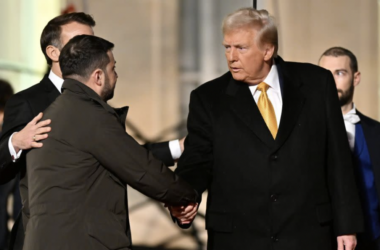Abu Mohammad al-Julani, the founder of al-Qaeda’s Syrian affiliate and leader of Hayat Tahrir al-Sham (HTS), is navigating a striking shift from infamy to potential legitimacy.
Once a top target for Western intelligence, al-Julani is now being eyed by some Western leaders as a potential political actor in Syria’s future.
Born between 1975 and 1979 to Syrian parents in Saudi Arabia, al-Julani, whose real name is Ahmed Hussein al-Shar’a, joined al-Qaeda in Iraq under Abu Musab al-Zarqawi during the U.S. invasion. He was captured in 2006 and spent five years in Iraqi prisons, including the notorious Abu Ghraib. In 2011, during Syria’s civil war, al-Julani founded Jabhat al-Nusra, al-Qaeda’s Syrian branch.
A Journey from Jihadist to Politician
In 2016, al-Julani severed ties with al-Qaeda, rebranding his group as Jabhat Fateh al-Sham and later HTS. Despite distancing himself from global jihadist networks, his name remained synonymous with terrorism. The U.S. labeled him a “Specially Designated Global Terrorist” in 2013 and, in 2017, offered a $10 million reward for information leading to his capture.
However, al-Julani began reframing HTS as a Syrian-focused rebel group. In a 2021 interview with PBS’s FRONTLINE, he stated, “We have not posed any threat to Western or European societies,” emphasizing HTS’s shift away from global jihad. Al-Julani claimed prior ties to al-Qaeda were “political labels” with no factual basis.
In recent years, HTS has sought to portray itself as a stabilizing force in Syria, respecting ethnic and religious minorities. This repositioning has influenced Western perceptions, though skepticism persists.
Western Strategy and Shifting Alliances
U.S. President Joe Biden recently called Syria’s political shift an “historic opportunity,” prioritizing an inclusive transition and continued efforts against ISIS. Notably absent from Biden’s remarks was any mention of al-Julani or HTS, despite their growing influence.
Critics argue the West’s softened stance on HTS stems from strategic interests rather than genuine changes within the group. Al-Julani’s ascent raises questions about whether Western governments are prioritizing regional stability over democratic principles by legitimizing a group that rose to power through armed struggle.
This dramatic shift illustrates how geopolitical priorities can reshape perceptions, but it also sparks debate over the ethical implications of partnering with figures like al-Julani.




